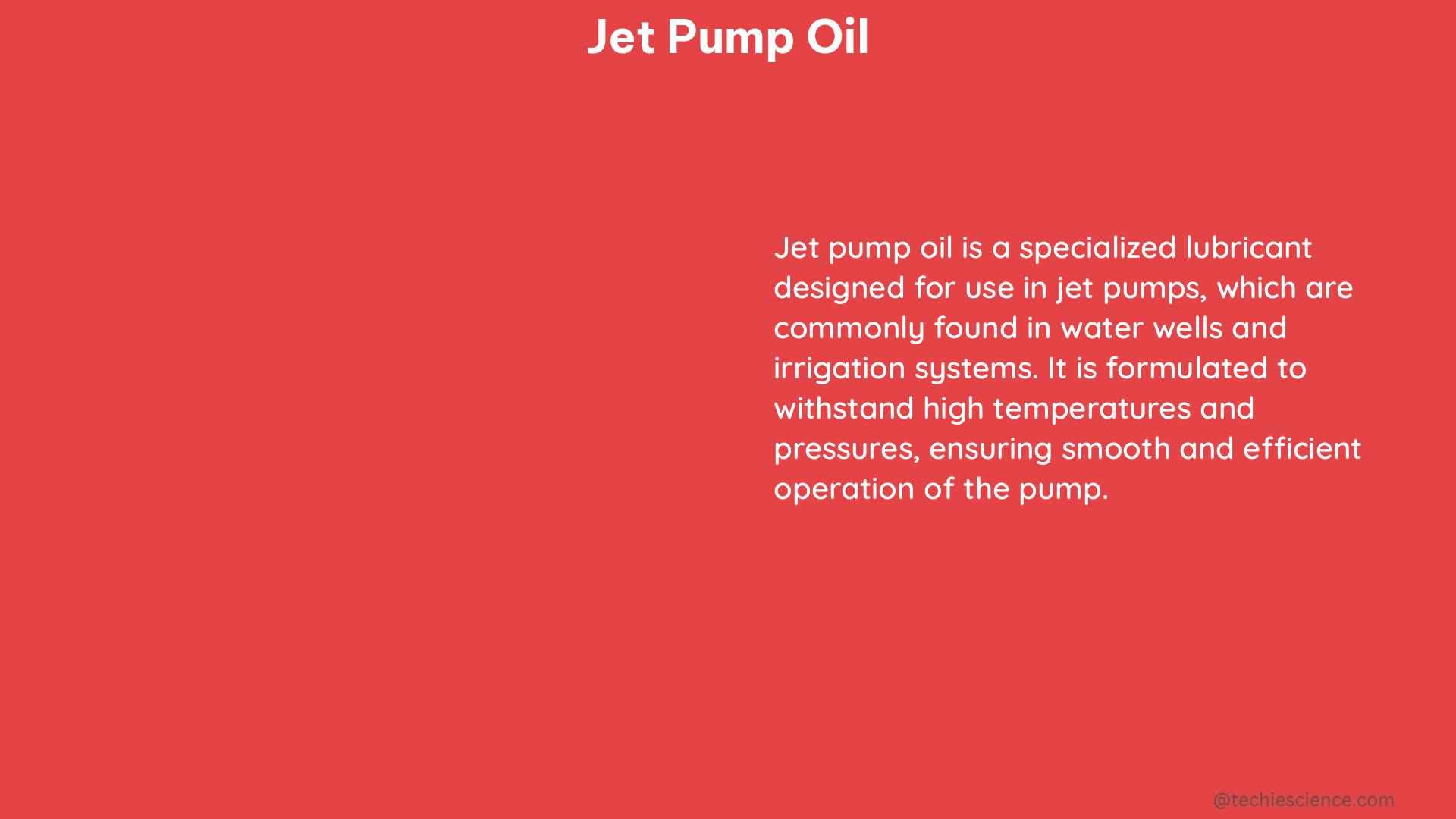Jet pump oil is a crucial component in the operation of jet pumps, which are artificial lift systems used in the oil and gas industry. The performance of jet pumps is significantly affected by the properties of the motive fluid, which is typically a mixture of oil and water. Understanding the measurable and quantifiable data points related to jet pump oil is essential for maximizing pump efficiency and optimizing oil recovery.
Viscosity: The Key to Efficient Pumping
The viscosity of the motive fluid is a critical factor that affects the performance of jet pumps. The viscosity of jet pump oil typically ranges from 5 to 50 centistokes (cSt) at reservoir temperature. The lower the viscosity, the easier it is to pump the fluid, which can result in higher pump efficiency and lower energy consumption.
- Optimal viscosity range: 5 to 20 cSt
- Viscosity reduction techniques:
- Blending with lower viscosity oils
- Heating the motive fluid to reduce viscosity
- Using viscosity modifiers or additives
Density: Balancing Lift and Energy Consumption

The density of jet pump oil is another important property that affects pump performance. The density of jet pump oil typically ranges from 800 to 1,000 kilograms per cubic meter (kg/m³) at reservoir temperature. The density of the motive fluid affects the pump’s ability to lift oil to the surface, and higher density fluids require more energy to pump.
- Optimal density range: 850 to 950 kg/m³
- Factors affecting density:
- Oil composition (API gravity)
- Water content
- Temperature
Pressure: Generating the Necessary Velocity and Lift
The pressure of the motive fluid is a critical factor in jet pump performance. The pressure of jet pump oil typically ranges from 1,000 to 5,000 pounds per square inch (psi) at the pump inlet. The pressure of the motive fluid affects the pump’s ability to generate the necessary velocity and pressure to lift the oil to the surface.
- Optimal pressure range: 2,000 to 4,000 psi
- Factors affecting pressure:
- Pump design and configuration
- Depth of the well
- Fluid flow rate
Temperature: Optimizing Viscosity and Efficiency
The temperature of jet pump oil is an important factor that affects pump performance. The temperature of jet pump oil typically ranges from 30 to 150 degrees Celsius (°C) at the pump inlet. Higher temperatures can reduce the viscosity of the motive fluid, which can improve pump efficiency and reduce energy consumption.
- Optimal temperature range: 40 to 80 °C
- Techniques for temperature control:
- Heating the motive fluid before injection
- Insulating the pump and piping system
- Monitoring and adjusting temperature based on performance
Flow Rate: Balancing Lift and Velocity
The flow rate of jet pump oil is a critical factor that affects pump performance. The flow rate of jet pump oil typically ranges from 10 to 1,000 barrels per day (BPD) at the pump inlet. The flow rate of the motive fluid affects the pump’s ability to generate the necessary velocity and pressure to lift the oil to the surface.
- Optimal flow rate range: 100 to 500 BPD
- Factors affecting flow rate:
- Pump design and configuration
- Reservoir characteristics
- Fluid properties (viscosity, density)
By understanding and optimizing these key properties of jet pump oil, operators can maximize the performance of their jet pumps, improve energy efficiency, and increase oil recovery. Regular monitoring and adjustment of these parameters, along with proper maintenance and operation of the jet pump system, are essential for achieving optimal results.
References
- Optimal performance of water-oil axial jet pump in an egyptian offshore oil field
- Selection and Successful Application of Jet Pumps in the Giant Mangala Field
- A discussion on measurement method by using hydraulic jet pump in well testing
- The Defining Series: Jet Pumps – SLB
- Investigation of the characteristics of an oil jet pump when using a group ground drive

The lambdageeks.com Core SME Team is a group of experienced subject matter experts from diverse scientific and technical fields including Physics, Chemistry, Technology,Electronics & Electrical Engineering, Automotive, Mechanical Engineering. Our team collaborates to create high-quality, well-researched articles on a wide range of science and technology topics for the lambdageeks.com website.
All Our Senior SME are having more than 7 Years of experience in the respective fields . They are either Working Industry Professionals or assocaited With different Universities. Refer Our Authors Page to get to know About our Core SMEs.